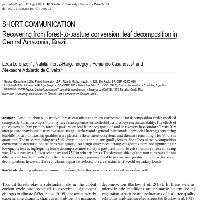Resumen
- Land-use change in tropical forests can affect the micro-environment for decomposition under modified canopies. In turn, decomposition may have consequences for soil fertility and ecosystem sustainability. The effects of the conversion from primary forest to pastures on leaf-litter decomposition and its recovery in secondary forests 20 y after pasture abandonment were evaluatedusing litterbags and a general mixedmodel approach. Litterbags containing leaf-litter of two contrasting qualities were placed in those three ecosystems and the mass remaining after 90 d was quantified. The mass remaining was 50% lower in high- than in low-quality leaves. The effects of the decomposition environment depended on the substrate quality. Although differences among ecosystems were not significant for low-quality leaves, high-quality leaves decomposed more slowly in pastures than in forests (mean dry mass remaining was 38% in pastures, 14% in secondary and 12% in primary forest). The decomposition of common substrates did not differ among forests. Results show that the conversion of primary forest to pasture may produce conditions for slower decomposition; however, these conditions appear be restored to a great extent in 20-y-old secondary forests.
